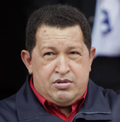“These reforms, passed without any debate, are a clear attempt by the Venezuelan government to further its clampdown on critics and independent media,” said Carlos Lauría, CPJ’s senior program coordinator for the Americas. “We condemn these laws and believe that if they are not vetoed, Venezuela’s democracy and freedom of expression will suffer serious setbacks.”
It only took a week for the Venezuelan legislature to approve a reform of the 2004 Law on Social Responsibility in Radio and Television that expanded existing broadcast regulations to the Internet. The new law bans messages that “incite or promote hatred,” “foment citizens’ anxiety or alter public order,” “disrespect authorities,” “encourage assassination,” or “constitute war propaganda,” according to Article 8. It also curbs electronic media content according to the time of the day, with adult content reserved for shows after midnight, including violent or sexual content and soap operas–and news images of violence.
Internet media must now “establish mechanisms to restrict, without delay, the dissemination of messages” that could break the law, according to a review of the law by CPJ. The National Telecommunications Commission (CONATEL), the government regulator, can now restrict information and access to websites in violation. Digital media that violate the law can be fined up to 13,000 bolivars (US$3,000), while service providers that fail to respond to government inquiries could be fined up to “10 percent of the previous year’s gross income,” in addition to “72 hours of continuous suspension of services.”
The Social Responsibility law, passed in 2004, has been widely criticized by press freedom advocates for its broad and vaguely worded restrictions on free expression. Article 29, for example, bars television and radio stations from broadcasting messages that “promote, defend, or incite breaches of public order” or “are contrary to the security of the nation.” CPJ research shows that Venezuelan broadcasters have cancelled critical news programming to comply with the law.
The legislature, where the official party has an absolute majority, also approved a reform of the telecommunications law that declared television and radio airwaves to be of “public service and interest,” a decision that critics said is aimed at expanding government control over the media. The legislation shortens broadcast concessions from 20 to 15 years, according to the reform, which was examined by CPJ. It gives CONATEL authority to pull the license of any broadcaster that violates the law more than once, which could force the only remaining critical private network, Globovisión, off the air. The network is facing a series of politically motivated investigations. Known for its strident antigovernment views, Globovisión has been the only critical private network broadcasting since RCTV went off the air in May 2007.
(A controversial amendment that would have forced owners of all TV and radio stations to re-register with CONATEL in person was stripped from the bill.)
Venezuelan journalists and press freedom advocates have strongly opposed both laws, asserting that the government will use them to further crackdown on media freedom. On Sunday, Chávez defended the social responsibility reform, arguing it was aimed at protecting citizens from cybercrimes.
This week, the National Assembly will also debate a bill for the protection of political freedom and national self-determination that, according to free press advocates, will limit funding and activities by Venezuelan nongovernment organizations, including human rights groups. According to the bill, NGOs that invite to Venezuela a foreigner who criticizes the government could be fined or even banned. The provision could seriously deter the work of press freedom NGOs, advocates said.
Chávez’s allies are trying to pass several bills before January 5, when a newly elected legislature takes office, according to local news reports. The ruling party lost its absolute majority in the September legislative elections. On Friday, the National Assembly gave Chávez the power to rule by decree for 18 months. The Venezuelan president said he is seeking these powers to help flood victims, but critics said the move is intended to further his political agenda.
